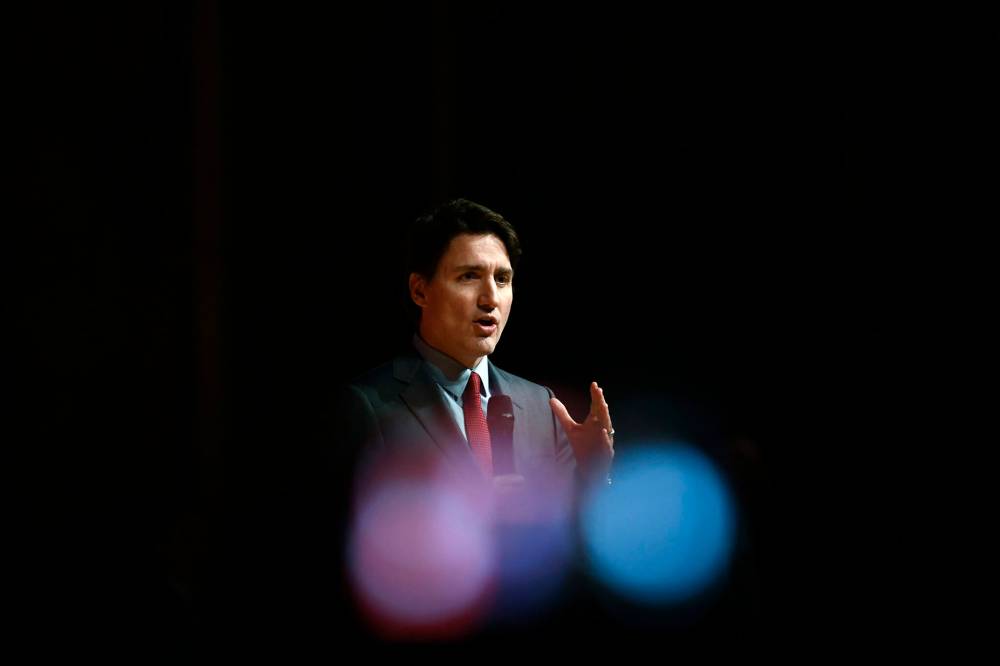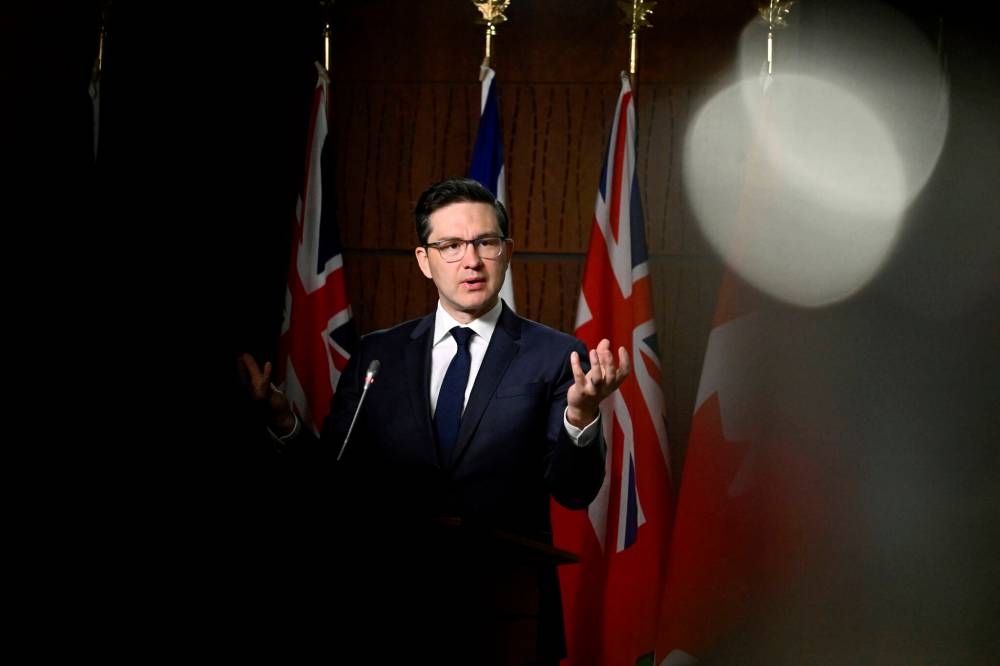So, um… how’d you two meet? Similarly disliked by a significant chunk of the electorate, the prime minister and Conservative leader are a political match made in hell
Read this article for free:
or
Already have an account? Log in here »
To continue reading, please subscribe:
Monthly Digital Subscription
$0 for the first 4 weeks*
- Enjoy unlimited reading on winnipegfreepress.com
- Read the E-Edition, our digital replica newspaper
- Access News Break, our award-winning app
- Play interactive puzzles
*No charge for 4 weeks then price increases to the regular rate of $19.00 plus GST every four weeks. Offer available to new and qualified returning subscribers only. Cancel any time.
Monthly Digital Subscription
$4.75/week*
- Enjoy unlimited reading on winnipegfreepress.com
- Read the E-Edition, our digital replica newspaper
- Access News Break, our award-winning app
- Play interactive puzzles
*Billed as $19 plus GST every four weeks. Cancel any time.
To continue reading, please subscribe:
Add Free Press access to your Brandon Sun subscription for only an additional
$1 for the first 4 weeks*
*Your next subscription payment will increase by $1.00 and you will be charged $16.99 plus GST for four weeks. After four weeks, your payment will increase to $23.99 plus GST every four weeks.
Read unlimited articles for free today:
or
Already have an account? Log in here »
Hey there, time traveller!
This article was published 09/01/2023 (1063 days ago), so information in it may no longer be current.
Underlying all the hyperbole and venomous trash talking exchanged by Prime Minister Justin Trudeau and Conservative leader Pierre Poilievre, there is a surprising yet inescapable truth.
They complete each other.
Although diametrically opposed in their views on most issues, Trudeau and Poilievre have quickly developed an utterly co-dependent relationship. One forged by the intense contempt most Canadians feel towards both men.
A rash of polling data that arrived late in 2022 and in the first few days of 2023 reveals how remarkably similar their predicaments are.
A Nanos poll commissioned by The Globe and Mail in late December found that 51 per cent of respondents would like the Liberal party to replace Trudeau as leader before the next election. Remarkably, 45 per cent wanted the Conservative party to replace Poilievre.
The popularity deficit being experienced by both leaders largely explains why the Liberals and Tories are locked in pretty much the same equation of popular support as they were in the last two federal elections, both of which resulted in Liberal minority governments.
The Tories are slightly ahead in most polls in terms of support, giving them a higher ceiling of potential seats in the House of Commons. However, as we’ve seen in previous elections, a slight advantage in support for the Conservatives — who have trouble garnering votes outside of Western Canada and parts of Ontario — means they could end up with slightly fewer seats overall.
Again, polling data shows how little this dynamic has changed.
Nanos found that Trudeau’s support was highest in Ontario and Quebec. He also got more support from younger voters and from women.
Not surprisingly, Poilievre has solid support to lead his party into the next election in the Prairies and, more surprisingly, Atlantic Canada. (More on that later.) He was more popular with men and with the 55-plus constituency that, if truth be told, is more likely to vote.
If both leaders remain in their current jobs and these poll results hold firm into the next election, which must be held no later than October 2025, we would be faced with another battle between a slightly lower but more efficient Liberal vote, and a larger but way-too concentrated Tory vote. The final result from a battle like that is, at this point, too close to call.
More concerning, however, is the impact this political gridlock could have on the electorate.

When significant portions of voters across political stripes express doubt about the worthiness of both the Liberal and Conservative party leaders, there is very little motivation for them to show up to vote. Unless something radical happens between now and the fall of 2025, we may be headed for a historic low turnout.
How did we get to this awful place? Historians will surely mark this as an era burdened by a lack of political talent.
On the one side, you have Trudeau, a leader who combines an almost inexhaustible capacity for self-inflicted political wounds with a bully-like approach to leading his party.
Trudeau simply cannot stop doing the wrong thing at the wrong time. Whether it is accepting free trips from people doing government business, black-face photos from his past or bullying members of his own cabinet, Trudeau’s unbridled arrogance may likely prevent him from ever winning another majority mandate.
This week, Poilievre got new material to work with when former Liberal finance minister Bill Morneau, promoting a new book, said Trudeau was more interested in scoring political points than delivering effective fiscal policy during the COVID-19 outbreak.
For Poilievre, Morneau’s scathing rebuke is a gift from the political gods. Unfortunately, while stuff like this may drive more Canadians to wish for a new Liberal leader, it will not make the Conservative party, or its inflammatory leader, any more popular.

By now, we should be able to conclude that Poilievre’s thinly veiled courtship of Canadians with extreme views has been an utter failure. If there was a huge, silent majority of people waiting for a political leader to combine alt-right populism, fiscal libertarianism and cryptocurrencies, it hasn’t materialized yet.
While Morneau was serving up new daggers to throw at Trudeau, Poilievre was doing his best to keep his enemies well-stocked with political arrows.
He recently offered a passionate defence of Jordan Peterson, the controversial clinical psychologist and University of Toronto professor who has become a darling of far-right conservatives all over the western world.
Poilievre says he does not support everything Peterson says but does believe he has a right to free speech. That, Poilievre acknowledged, will set off “liberal critics in the media will” for cosying up to the mercurial Peterson.
Poilievre’s clumsy attempt to appeal to far-right voters isn’t fooling anyone. In fact, all he’s doing is providing lots and lots of great ammunition for the Liberals to use in the next election.
That leaves voters stuck with a most unpalatable scenario.
Two men who most Canadians think are unworthy of being prime minister, clinging to their jobs based on the most tenuous of rationales: no matter how bad I am, I’m less hapless than the other guy.
dan.lett@winnipegfreepress.com

Born and raised in and around Toronto, Dan Lett came to Winnipeg in 1986, less than a year out of journalism school with a lifelong dream to be a newspaper reporter.
Our newsroom depends on a growing audience of readers to power our journalism. If you are not a paid reader, please consider becoming a subscriber.
Our newsroom depends on its audience of readers to power our journalism. Thank you for your support.














